(完整版)八年级上册英语第一单元知识点
- 格式:docx
- 大小:10.82 KB
- 文档页数:3
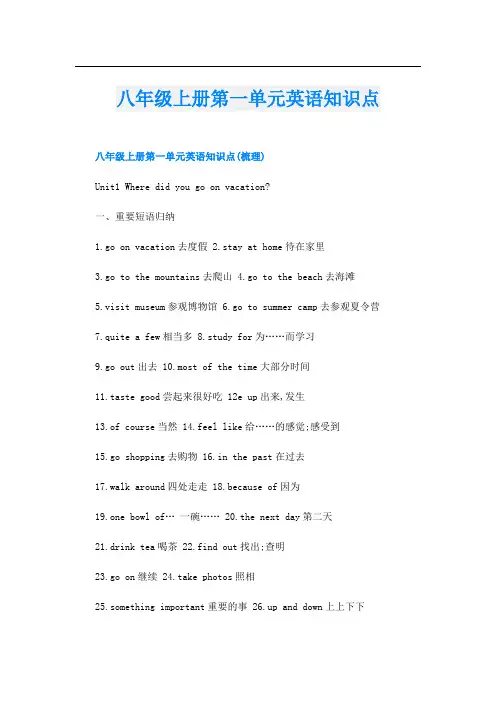
八年级上册第一单元英语知识点八年级上册第一单元英语知识点(梳理)Unit1 Where did you go on vacation?一、重要短语归纳1.go on vacation去度假2.stay at home待在家里3.go to the mountains去爬山4.go to the beach去海滩5.visit museum参观博物馆6.go to summer camp去参观夏令营7.quite a few相当多8.study for为……而学习9.go out出去 10.most of the time大部分时间11.taste good尝起来很好吃 12e up出来,发生13.of course当然 14.feel like给……的感觉;感受到15.go shopping去购物 16.in the past在过去17.walk around四处走走 18.because of因为19.one bowl of…一碗…… 20.the next day第二天21.drink tea喝茶 22.find out找出;查明23.go on继续 24.take photos照相25.something important重要的事 26.up and down上上下下27.have a good time玩得高兴=enjoy oneself=have great fun二、语法专项1.复合不定代词①定义a)复合不定代词由some; any; no; every和body; thing; one构成的合成词。
即:复合不定代词:something, somebody, someone;anything,anybody, anyone,nothing, nobody, no one; everything, everybody, everyoneb) 它们在句中可用作主语、宾语或表语,但不能用作定语。
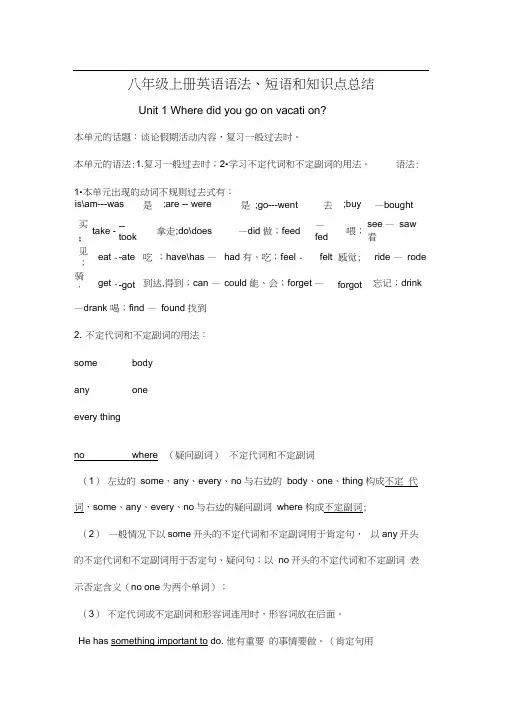
八年级上册英语语法、短语和知识点总结Unit 1 Where did you go on vacati on?本单元的话题:谈论假期活动内容,复习一般过去时。
本单元的语法:1.复习一般过去时;2•学习不定代词和不定副词的用法。
语法: 1•本单元出现的动词不规则过去式有:is\am---was 是;are -- were 是;go---went 去;buy —bought买;take ---took拿走;do\does —did 做;feed—fed喂;see —saw看见;eat --ate 吃;have\has —had 有、吃;feel -felt 感觉;ride —rode 骑;get --got 到达,得到;can — could 能、会;forget —forgot 忘记;drink —drank 喝;find —found 找到2. 不定代词和不定副词的用法:some bodyany oneevery thingno where (疑问副词)不定代词和不定副词(1)左边的some、any、every、no 与右边的body、one、thing 构成不定代词,some、any、every、no与右边的疑问副词where 构成不定副词;(2)—般情况下以some开头的不定代词和不定副词用于肯定句,以any开头的不定代词和不定副词用于否定句、疑问句;以no开头的不定代词和不定副词表示否定含义(no one为两个单词);(3)不定代词或不定副词和形容词连用时,形容词放在后面。
He has something important to do. 他有重要的事情要做。
(肯定句用something,形容词important 放后)Did you buy anything special?(一般疑问句用anything,形容词special放后)Did you go any where interesting last mon th? 上个月你去令人感兴趣的地方了吗?(一般疑问句用不定副词anywhere,形容词interesting 放后)(4)不定代词和不定副词做主语时,后面的动词用单数形式。
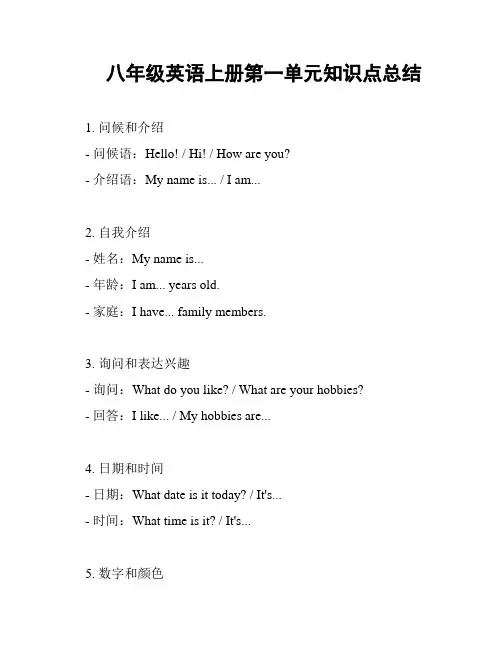
八年级英语上册第一单元知识点总结1. 问候和介绍- 问候语:Hello! / Hi! / How are you?- 介绍语:My name is... / I am...2. 自我介绍- 姓名:My name is...- 年龄:I am... years old.- 家庭:I have... family members.3. 询问和表达兴趣- 询问:What do you like? / What are your hobbies?- 回答:I like... / My hobbies are...4. 日期和时间- 日期:What date is it today? / It's...- 时间:What time is it? / It's...5. 数字和颜色- 数字:Counting from 1 to 10.- 颜色:Red, yellow, blue, green, etc.6. 学校生活- 学科:Subjects like math, English, science, etc.- 教室:Classroom, blackboard, desk, etc.- 研究活动:Study, read, write, listen, speak, etc.7. 家庭成员- 家人:Father, mother, brother, sister, etc.- 关系:My father is... / My mother is...8. 日常活动- 问答:What do you do in the morning/afternoon/evening? - 回答:I... / I usually...9. 问路和指示- 问路:Excuse me, where is the...?- 指示:Go straight, turn left/right, etc.10. 国家和语言- 国家:China, America, England, etc.- 语言:Chinese, English, French, etc.以上是八年级英语上册第一单元的基本知识点总结。
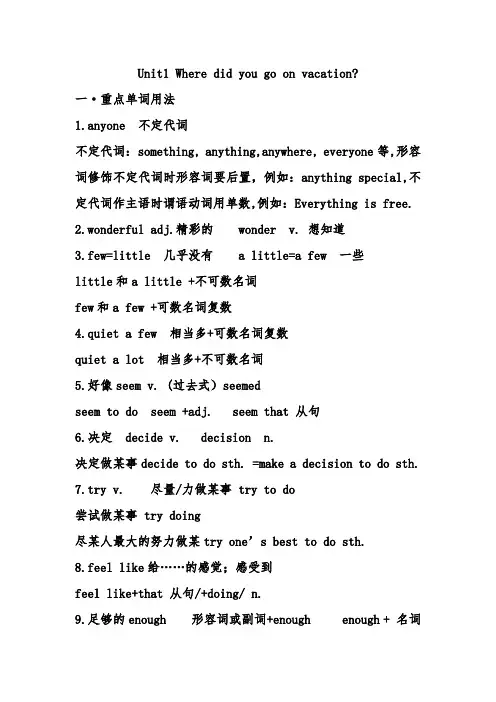
Unit1 Where did you go on vacation?一·重点单词用法1.anyone 不定代词不定代词:something, anything,anywhere, everyone等,形容词修饰不定代词时形容词要后置,例如:anything special,不定代词作主语时谓语动词用单数,例如:Everything is free.2.wonderful adj.精彩的 wonder v. 想知道3.few=little 几乎没有 a little=a few 一些little和a little +不可数名词few和a few +可数名词复数4.quiet a few 相当多+可数名词复数quiet a lot 相当多+不可数名词5.好像seem v. (过去式)seemedseem to do seem +adj. seem that 从句6.决定 decide v. decision n.决定做某事decide to do sth. =make a decision to do sth.7.try v. 尽量/力做某事 try to do尝试做某事 try doing尽某人最大的努力做某try one’s best to do sth.8.feel like给……的感觉;感受到feel like+that 从句/+doing/ n.9.足够的enough 形容词或副词+enough enough + 名词10.不喜欢 dislike v. 同义词:hate 反义词:like/love不喜欢做某事 dislike doing sth.二.课文中的重点1.做某事很有乐趣have fun (doing sth.) = have a good time( doing sth.)=enjoy oneself (doing sth.)他们每天打排球很有乐趣。
They have fun playing basketball every day.=They have a good time playing basketball every day.=They enjoy themselves playing basketball every day. 2.到达。
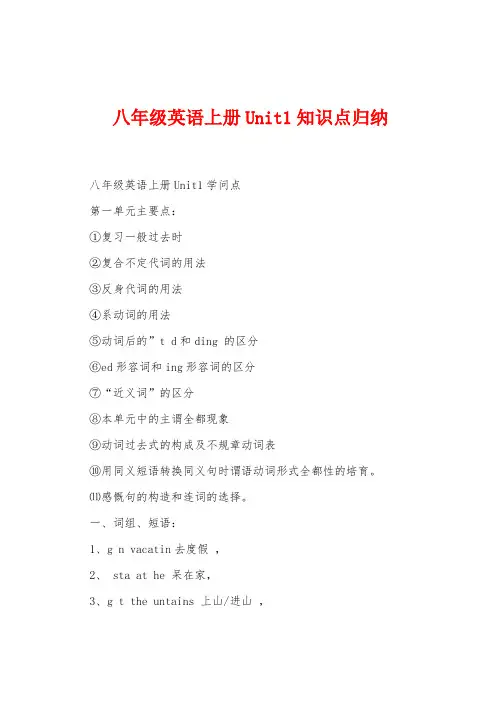
八年级英语上册Unit1知识点归纳八年级英语上册Unit1学问点第一单元主要点:①复习一般过去时②复合不定代词的用法③反身代词的用法④系动词的用法⑤动词后的”t d和ding 的区分⑥ed形容词和ing形容词的区分⑦“近义词”的区分⑧本单元中的主谓全都现象⑨动词过去式的构成及不规章动词表⑩用同义短语转换同义句时谓语动词形式全都性的培育。
⑾感慨句的构造和连词的选择。
一、词组、短语:1、g n vacatin去度假,2、 sta at he 呆在家,3、g t the untains 上山/进山,4、 g t the beach到海边去,5、visit useus 参观博物馆,6、g t suer cap 去夏令营,7、 quite a fe而且由于坏天气,我们也没能看到下面的任何风光(P5)辨析:because f与becausea. because f意为“由于,由于”,后可接名词、代词或动名词,不能接句子。
He lst his b because f his age.b. because意为“由于”,引导状语从句,即接句子。
I didn’t bu the shirt because itfrget ding sth. 意为“遗忘做过某事(事情已经做过了)” eg: I frget clsing the15. Abut ne hur later, 教师刚刚告知我们擦窗户。
2)eep ding sth. 意为“连续做某事,始终做某事”。
She TV fr tw hurs last night. 昨晚她持续看了两个小时的电视。
23. Everne uped up and dwn in exciteent. 大家都兴奋地跳起来。
(P8)up and dwn 意为“上上下下;来来回回”,在句中作状语。
22. 反身代词:self , urselves, urself , urselves, hiself,herself, itself, theselves.作动词或介词的宾语:常常在en, teach, hurt, bu, intrduce, dress, ill等动词和b, fr, t, f等介词后作宾语。
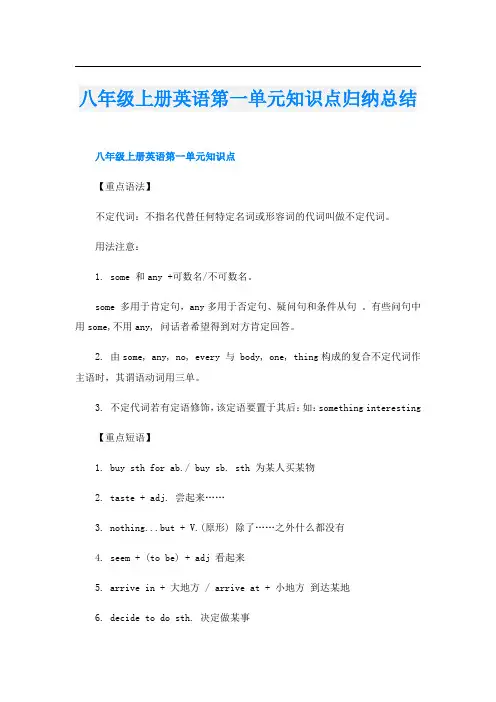
八年级上册英语第一单元知识点归纳总结八年级上册英语第一单元知识点【重点语法】不定代词:不指名代替任何特定名词或形容词的代词叫做不定代词。
用法注意:1. some 和any +可数名/不可数名。
some 多用于肯定句,any多用于否定句、疑问句和条件从句。
有些问句中用some,不用any, 问话者希望得到对方肯定回答。
2. 由some, any, no, every 与 body, one, thing构成的复合不定代词作主语时,其谓语动词用三单。
3. 不定代词若有定语修饰,该定语要置于其后:如:something interesting【重点短语】1. buy sth for ab./ buy sb. sth 为某人买某物2. taste + adj. 尝起来……3. nothing...but + V.(原形) 除了……之外什么都没有4. seem + (to be) + adj 看起来5. arrive in + 大地方 / arrive at + 小地方到达某地6. decide to do sth. 决定做某事7. try doing sth. 尝试做某事 / try to do sth. 尽力做某事8. enjoy doing sth. 喜欢做某事9. want to do sth. 想去做某事10. start doing sth. 开始做某事=begin doing sth.11. stop doing sth. 停止做某事区分:stop to do sth. 停下来去做某事12. dislike doing sth. 不喜欢做某事14. so + adj + that + 从句如此……以至于……16. tell sb. (not) to do sth. 告诉某人(不要) 做某事17. keep doing sth. 继续做某事18. forget to do sth. 忘记去做某事 / forget doing sth 忘记做过某事【词语辨析】1. take a photo/ take photos 拍照quite a few+名词复数“许多…”2. seem + 形容词看起来…... You seem happy today.seem + to do sth. 似乎/好像做某事 I seem to have a coldIt seems + 从句似乎..…. It seems that no one believe you.seem like ... 好像,似乎….. It seems like a good idea.3. arrive in +大地点= get to= reach+地点名“到达......”arrive at +小地点(注:若后跟地点副词here/there/home, 介词需省略,如:arrive here; get home)4. feel like sth 感觉像…feel doing sth. 想要做某事5. wonder(想知道)+疑问词(who, what, why)引导的从句。
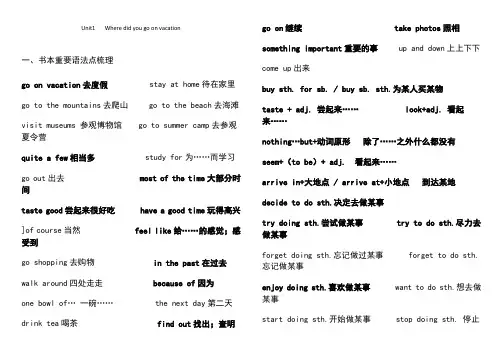
Unit1 Where did you go on vacation一、书本重要语法点梳理go on vacation去度假 stay at home待在家里go to the mountains去爬山 go to the beach去海滩visit museums 参观博物馆 go to summer camp去参观夏令营quite a few相当多 study for为……而学习go out出去most of the time大部分时间taste good尝起来很好吃 have a good time玩得高兴]of course当然feel like给……的感觉;感受到go shopping去购物in the past在过去walk around四处走走because of因为one bowl of…一碗…… the next day第二天drink tea喝茶find out找出;查明go on继续 take photos照相something important重要的事 up and down上上下下come up出来buy sth. for sb. / buy sb. sth.为某人买某物taste + adj. 尝起来…… look+adj. 看起来……nothing…but+动词原形除了……之外什么都没有seem+(to be)+ adj. 看起来……arrive in+大地点 / arrive at+小地点到达某地decide to do sth.决定去做某事try doing sth.尝试做某事 try to do sth.尽力去做某事forget doing sth.忘记做过某事 forget to do sth.忘记做某事enjoy doing sth.喜欢做某事 want to do sth.想去做某事start doing sth.开始做某事 stop doing sth. 停止做某事dislike doing sth. 不喜欢做某事keep doing sth.继续做某事Why not do. sth.为什么不做……呢so+adj.+that+从句如此……以至于……tell sb. (not) to do sth. 告诉某人(不要)做某事1. on vacation 度假vacation意为“假期、假日”,相当于holiday,但vacation 表示长的假期。
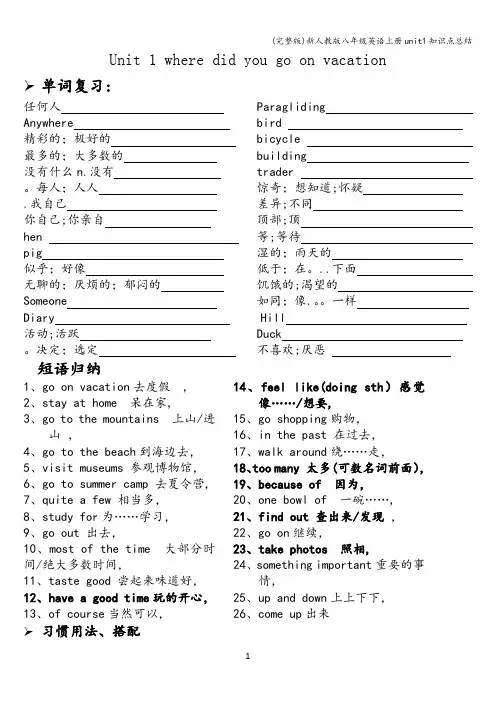
Unit 1 where did you go on vacation ➢单词复习:任何人Anywhere 精彩的;极好的最多的;大多数的没有什么n.没有。
每人;人人.我自己你自己;你亲自hen pig似乎;好像无聊的;厌烦的;郁闷的Someone Diary 活动;活跃。
决定;选定Paragliding bird bicycle building trader惊奇;想知道;怀疑差异;不同顶部;顶等;等待湿的;雨天的低于;在。
..下面饥饿的;渴望的如同;像.。
一样HillDuck不喜欢;厌恶短语归纳1、go on vacation去度假 ,2、stay at home 呆在家,3、go to the mountains 上山/进山,4、go to the beach到海边去,5、visit museums 参观博物馆,6、go to summer camp 去夏令营,7、quite a few 相当多,8、study for为……学习,9、go out 出去,10、most of the time 大部分时间/绝大多数时间,11、taste good 尝起来味道好,12、have a good time玩的开心,13、of course当然可以,14、feel like(doing sth)感觉像……/想要,15、go shopping购物,16、in the past 在过去,17、walk around绕……走,18、too many 太多(可数名词前面),19、because of 因为,20、one bowl of 一碗……,21、find out 查出来/发现,22、go on继续,23、take photos 照相,24、something important重要的事情,25、up and down上上下下,26、come up出来➢习惯用法、搭配1. buy sth。
for sb.=buy sb. sth。
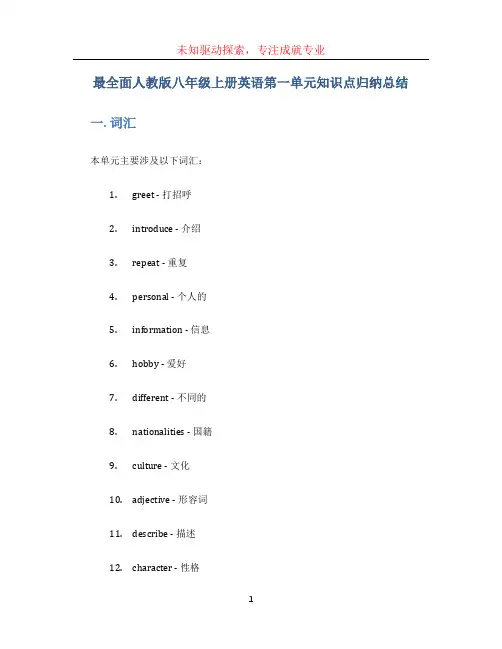
最全面人教版八年级上册英语第一单元知识点归纳总结一. 词汇本单元主要涉及以下词汇:1.greet - 打招呼2.introduce - 介绍3.repeat - 重复4.personal - 个人的rmation - 信息6.hobby - 爱好7.different - 不同的8.nationalities - 国籍9.culture - 文化10.adjective - 形容词11.describe - 描述12.character - 性格二. 语法本单元的语法重点包括:1.be动词(am, is, are)–表示个人特征和国籍,e.g. I am from China.–表示人称和单复数,e.g. We are students.2.人称代词–主格:I, you, he, she, it, we, they–宾格:me, you, him, her, it, us, them3.物主代词–形容词性:my, your, his, her, its, our, their–名词性:mine, yours, his, hers, its, ours, theirs4.形容词的比较级和最高级–比较级:形容词+er,e.g. happier–最高级:the+形容词+est,e.g. the happiest5.数词的基数词和序数词–基数词:one, two, three…–序数词:first, second, third…三. 句型本单元的常用句型有:1.问候语–How do you do?–Nice to meet you.–Good morning/afternoon/evening.2.自我介绍–My name is [name]. I am [age] years old. I am from [country].3.描述个人特征–I am [adjective].–He/She is [adjective].–They are [adjective].4.提问对方的个人信息–What’s your name?–How old are you?–Where are you from?四. 对话本单元的对话主要涉及以下场景:1.两人相互介绍个人信息2.询问对方的国籍和爱好3.描述自己和他人的外貌和性格特征4.向他人提问个人信息并进行回答五. 拓展练习为了加深对本单元知识点的理解和应用,推荐进行以下练习:1.编写自我介绍,包括姓名、年龄、国籍、爱好等。
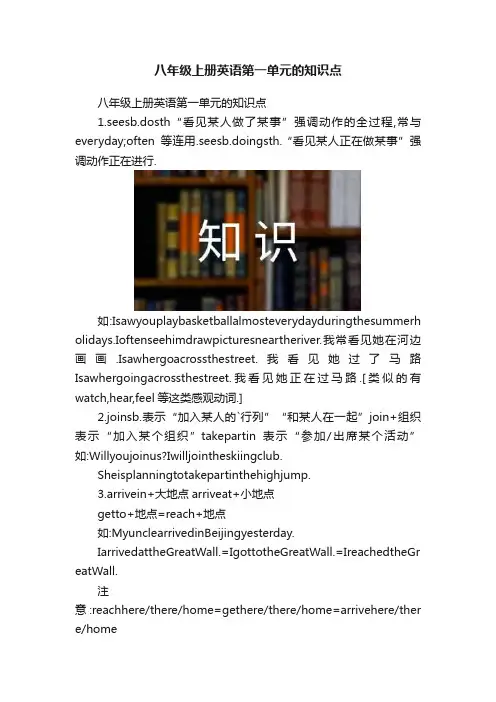
八年级上册英语第一单元的知识点八年级上册英语第一单元的知识点1.seesb.dosth“看见某人做了某事”强调动作的全过程,常与everyday;often等连用.seesb.doingsth.“看见某人正在做某事”强调动作正在进行.如:Isawyouplaybasketballalmosteverydayduringthesummerh olidays.Ioftenseehimdrawpicturesneartheriver.我常看见她在河边画画.Isawhergoacrossthestreet.我看见她过了马路Isawhergoingacrossthestreet.我看见她正在过马路.[类似的有watch,hear,feel等这类感观动词.]2.joinsb.表示“加入某人的`行列”“和某人在一起”join+组织表示“加入某个组织”t akepartin表示“参加/出席某个活动”如:Willyoujoinus?Iwilljointheskiingclub.Sheisplanningtotakepartinthehighjump.3.arrivein+大地点arriveat+小地点getto+地点=reach+地点如:MyunclearrivedinBeijingyesterday.IarrivedattheGreatWall.=IgottotheGreatWall.=IreachedtheGr eatWall.注意:reachhere/there/home=gethere/there/home=arrivehere/ther e/home4.leave…离开……leavefor…动身去…/离开到…如:TheyareleavingBeijingtomorrow.明天他们要离开北京.TheyareleavingforJapanthedayaftertomorrow.后天他们要前往日本.5.afew“几个;一些”修饰可数名6.词alittle“一点点”修饰不数名词如:Thereareafeweggsinthebasket.Thereisalittlewaterinthebottle.句型1.What’syourfavoritesport?=Whatsportdoyoulikebest?你最喜爱的运动是什么?2.Whichsportdoyouprefer?=Whichsportdoyoulikebetter?你更喜欢什么运动?Ipreferskating.=Ilikeskatingbetter.我更喜欢滑雪.3.Doyouskatemuch?=Doyouoftenskate?你常滑雪吗?4.Shespendsatleasthalfanhourinthegymeveryday.每天她至少花半小时在体育馆.29.Sheplaysbaseballprettywellandsheisalsogoodatjumping.她棒球打得相当好而且擅长于跳.4.Whatkindofsportsdoyoulike?=Whichsportdoyoulike?你喜欢哪种运动?。
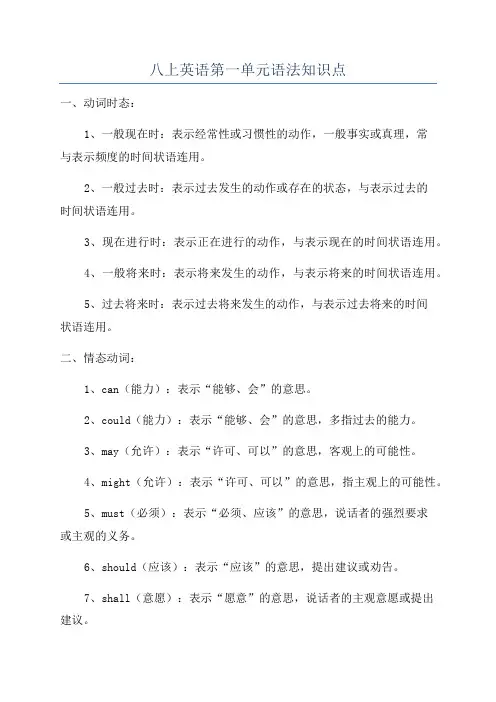
八上英语第一单元语法知识点
一、动词时态:
1、一般现在时:表示经常性或习惯性的动作,一般事实或真理,常
与表示频度的时间状语连用。
2、一般过去时:表示过去发生的动作或存在的状态,与表示过去的
时间状语连用。
3、现在进行时:表示正在进行的动作,与表示现在的时间状语连用。
4、一般将来时:表示将来发生的动作,与表示将来的时间状语连用。
5、过去将来时:表示过去将来发生的动作,与表示过去将来的时间
状语连用。
二、情态动词:
1、can(能力):表示“能够、会”的意思。
2、could(能力):表示“能够、会”的意思,多指过去的能力。
3、may(允许):表示“许可、可以”的意思,客观上的可能性。
4、might(允许):表示“许可、可以”的意思,指主观上的可能性。
5、must(必须):表示“必须、应该”的意思,说话者的强烈要求
或主观的义务。
6、should(应该):表示“应该”的意思,提出建议或劝告。
7、shall(意愿):表示“愿意”的意思,说话者的主观意愿或提出
建议。
三、动词的变化:
1、动词的变化有两种:规则变化和不规则变化。
2、规则变化:一般以-ed结尾,如:look—looked;walk—walked。
3、不规则变化:三个部分:人称变化、时态变化和语态变化,如:go—went—gone;draw—drew—drawn。
Unit1 Where did you go on vacation 一、短语归纳go on vacation去度假 stay at home待在家里 go to the mountains去爬山 go to the beach去海滩 visit museums 参观博物馆 quite a few相当多go to summer camp去参观夏令营 study for为……而学习 go out 出去most of the time大部分时间 taste good尝起来很好吃 of course当然go shopping去购物 come up出来 drink tea喝茶in the past在过去 walk around四处走走 study for tests 为了测试而学习one bowl of… 一碗…… the next day第二天 keep a diary (写日记)take photos照相 something important重要(de)事 up and down 上上下下二、知识点归纳1. because of因为后接名词 because 后接从句2. buy sth. for sb. / buy sb. sth.为某人买某物 buy sth + from + sp. 从某地买某东西3. taste + adj. 尝起来…… look+adj. 看起来……4. have a good time = have fun 玩得高兴 feel like给……(de)感觉;感受到5. there is nothing to do…but + do(动词原形) 除了……之外什么都没有6. seem+(to be)+ adj. 看起来…… seem that + 从句7. arrive in+大地点 / arrive at+小地点到达某地8. decide to do sth.决定去做某事 decide on sth 决定某事9. try doing sth.尝试做某事 / try to do sth.尽力去做某事10. forget doing sth.忘记做过某事/ forget to do sth.忘记做某事11. enjoy doing sth.喜欢做某事 dislike doing sth. 不喜欢做某事12. start doing sth.开始做某事 keep doing sth.继续做某事13. stop doing sth. 停止做某事 stop to do sth 停下来去做另外一件事14. Why not do. sth.为什么不做……呢Why don’t you do sth.15. so+adj.+that+从句如此……以至于……16. tell sb. (not) to do sth. 告诉某人(不要)做某事17. wait for sb. 等待某人 should + 动词原形应该做某事18. take the train = by train 乘火车19. enough 放在名词前后皆可,放在形容词副词后20. what + a/an + adj + n + 主语 + 谓语How + adj/adv + 主语 + 谓语感叹句三、句子1. Where did you go on vacation 你去哪里度假了2. When we got the top, it was raining really hard. 当我们到达山顶时,雨下(de)很大.3. I wonder what life was like here in the past. 我想知道这过去(de)生活是什么样(de).四、作文:假如你是林涛,去年夏天去北京度假,参观过许多地方.以My vacation为题目写一篇作文Last summer, I went to Beijing on vacation with my parents. The weather was sunny and hot. First we visit the Great wall. It was the longest wall in the world. The next day, we visited the Palace Museum and Tian’anmen Square. We took a lot of photos there. We also some other interesting places in Beijing. We had Beijing duck, too. We had a good time there. It was very tired, but happy.。
八年级上册英语unit1知识点整理01Unit1单词anyone /'eniw?n/ pron.任何人anywhere /'eniwe?(r)/ adv.任何地方wonderful /'w?nd?fl/ adj.精彩的;绝妙的few/ fju:/adj.&pron.不多;很少quite a few相当多;不少(后接可数名词)most /m??st/ adj.,adv.&pron.最多;大多数something /'s?mθ??/ pron.某事;某物nothing (=not…anything) /'n?θ??/ pron.没有什么;没有一件东西everyone /'evriw?n/ pron.每人;人人;所有人of course /?vk?:s/ 当然;自然myself /ma?'self/ pron.我自己;我本人yourself /j?:'self/ pron.你自己;您自己hen /hen/ n.母鸡pig /p?g/n.猪seem /si:m/ vi.好像;似乎;看来bored /b?:d/ adj.厌倦的;烦闷的someone /'s?mw?n/ pron.某人diary /'da??ri/ n.日记;日记簿(keep a diary)activity /?k't?v?ti/ n.活动decide /d?'sa?d/ v.决定;选定(decide to do sth.)try /tra?/ v.尝试;设法;努力 (try to do sth. /try doing sth.)paragliding /'p?r?ɡla?d??/ n.空中滑翔跳伞feel like 给……的感觉;感受到bird /b?:d/ n.鸟bicycle /'ba?s?kl/ n.自行车;脚踏车building /'b?ld??/ n.建筑物;房子trader /'tre?d?(r)/ n.商人wonder /'w?nd?(r)/ v.想知道;琢磨difference /'d?fr?ns/ n.差别;差异top /t?p/ n.顶部;表面wait /we?t/ v.等待;等候(wait for)umbrella /?m'brel?/ n.伞;雨伞wet /wet/ adj.湿的;雨天的because of因为below /b?'l??/ prep.&adv.在……下面;到……下面enough /?'n?f/ adj.足够的(地)adv.充足的(地);充分的(地) hungry /'h??ɡri/ adj.饥饿的as /?z/ conj.像……一样;如同hill /h?l/ n.小山;山丘duck /d?k/ n.鸭dislike /d?s'la?k/v.&n.不喜爱(的事物);厌恶(的事物) Central Park 中央公园(美国纽约) HuangguoshuWarterfall /'w?:t?(r)f?:l/ 黄果树瀑布(贵州)HongKong /,h??'k??/,/'ha:?,ka:?/香港(中华人民共和国特别行政区)Malaysia /m?'le/马来西亚;Malaysian /m?'le??n/adj.马来西亚的;n.马来西亚人; Georgetown /?d??:d?ta?n/乔治市(马来西亚)Weld /weld/ Quay /ki:/ 海墘街Penang /p??n??/ Hill 槟城山(马来西亚)Tian'anmen Square /skwe?/,/skwer/天安门广场the Palace /?p?l?s/ Museum 故宫博物院Mark /mɑ:(r)k/马克(男名)02Unit1知识梳理Unit1. Where did you go on vacation?【重点短语】1. go on vacation 去度假2. stay at home 呆在家3. go to the mountains 上山/进山4. go to the beach 到海边去5. visit museums 参观博物馆6. go to the summer camp 去夏令营7. quite a few 相当多8. study for为…… 学习,9. go out 出去10. most of the time 大部分时间/绝大多数时间11. taste good 尝起来味道好12. have a good time 玩的开心13. of course 当然可以14. feel like 感觉像……/想要15. go shopping 去购物16. in the past 在过去17. walk around 绕……走18. too many 太多(可数名词前面)19. because of 因为20. one bowl of 一碗……21. find out 查出来/发现22. go on 继续23. take photos 照相24. something important 重要的事情25. up and down 上上下下26. e up 出来【重点句型】1. —Where did you go on vacation? 你到哪里去度假了?—I went to New York City. 我去了纽约城。
Unit1 Where did you go on vacation?短语归纳:go on vacation去度假stay at home待在家里go to the mountains去爬山go to the beach去海滩visit museums 参观博物馆go to summer camp去参加夏令营quite a few相当多study for.. 为……而学习most of the time大部分时间taste good尝起来很好吃have a good time玩得高兴of course=sure当然come up出来,升起go shopping去购物in the past在过去walk around四处走走because of因为one bowl of… 一碗……the next day第二天go out出去,外出drink tea喝茶find out找出;查明go on继续take photos照相something important重要的事up and down上上下下feel like给……的感觉;感受到;想要in excitement 处于兴奋之中too many/much太多because of 因为keep a diary 写日记along the way沿途wait for…等候固定搭配:buy sth. for sb. / buy sb. sth.为某人买某物so+adj.+that+从句如此…以至于…taste + adj. 尝起来…… look+adj. 看起来……nothing…but+动词原形除了……之外什么都没有nothing=not….anything没有什么seem+(to be)+ adj. 看起来……seem to do sth.似乎要做某事arrive in+大地点/ arrive at+小地点=get to+地点到达某地decide(not) to do sth.决定(不)去做某事tell sb(not)to do sth.告诉某人不要做某事try doing sth.尝试做某事/ try to do sth设法、.尽力去做某事forget doing sth.忘记做过某事forget to do sth.忘记去做某事want to do sth.=would like to do sth=feel like doing sth想要做某事enjoy/like doing sth.喜欢做某事dislike doing sth. 不喜欢做某事start doing sth.开始做某事wonder=want to know 想知道stop doing sth. 停止(正在)做某事stop to do sth停止去做某事keep doing sth.继续做某事Why not do. sth.?为什么不做……呢?enjoy oneself =have a good/great time=have fun过得愉快,玩的开心词性转换:唯一的问题是在晚上除过读书之外没有别的事可做。
新课标八年级上册英语单元知识点归纳Unit1 Where did you go on vacation?短语归纳1.go on vacation去度假2.stay at home待在家里3.go to the mountains去爬山4.go to the beach去海滩5.visit museums 参观博物馆6.go to summer camp去参加夏令营7.quite a few相当多8.study for tests为测验而学习9.go out出去10.most of the time大部分时间11.have a good time doing=have fun doing =enjoy oneself玩得高兴12.of course=sure =certainly当然13.feel like给……的感觉;感受到14.go shopping去购物15.in the past在过去16.walk around四处走走17.because of+名词短语:因为because+句子18. a/one bowl of…一碗……19. the next day第二天20.drink tea喝茶21.find out找出;查明22.go on继续23.take photos照相24.something important重要的事25.up and down上上下下e up出来come out 出版发行27.go out with anyone 跟别人出去28.say about 发表对…看法29.rain hard 雨下得大30.too much+不可数名词太多too many+可数名词复数太多much too+形容词太用法:1.buy sth. for sb. / buy sb. sth.为某人买某物2.taste / look/sound/smell good. 尝起来/看起来/听起来/闻起来不错3.nothing…but+动词原形除了……之外什么都没有4.seem+(to be)+ adj. 看起来……5.arrive in+大地点/ arrive at+小地点/get to +地点/reach +地点到达某地6.decide to do sth.决定去做某事7.try doing sth.尝试做某事/ try to do sth.尽力去做某事8.forget doing sth.忘记做过某事/ forget to do sth.忘记做某事9.enjoy doing sth.喜欢做某事10. want to do sth.想去做某事11.start doing sth.开始做某事12.stop doing sth. 停止做某事13.dislike doing sth. 不喜欢做某事14.keep doing sth.继续做某事keep on doing sth 不停做某事15.Why not do. sth.=why don’t you do sth为什么不做……呢?16.so+adj.+that+从句如此……以至于……17.tell sb. (not) to do sth. 告诉某人(不要)做某事18.enough +名词,形容词+enough19.not really .真的没有。
八年级上册英语知识总结第一单元一、重点单词。
1. anyone.- 不定代词,意为“任何人”,常用于疑问句和否定句中。
例如:Did anyone call me just now?(刚才有人给我打电话吗?)2. anywhere?- 副词,意为“在任何地方;无论何处”。
例如:I can't find my keys anywhere.(我到处都找不到我的钥匙。
)3. wonderful.- 形容词,意为“精彩的;绝妙的”。
例如:We had a wonderful time at the party.(我们在聚会上玩得很开心。
)4. few.- 形容词,意为“不多;很少”,修饰可数名词复数,表示否定意义。
例如:There are few students in the classroom.(教室里几乎没有学生。
)- 其比较级是fewer,最高级是fewest。
5. most.- 形容词,意为“最多的;大多数的”,可修饰可数名词复数或不可数名词。
例如:Most students like English.(大多数学生喜欢英语。
)- 也可作副词,意为“最;非常”。
例如:This is the most interesting book.(这是最有趣的书。
)6. something.- 不定代词,意为“某事;某物”,常用于肯定句中。
例如:I have something important to tell you.(我有重要的事情要告诉你。
)7. nothing.- 不定代词,意为“没有什么;没有一件东西”。
例如:There is nothing in the box.(盒子里什么都没有。
)8. everyone.- 不定代词,意为“每人;人人;所有人”。
例如:Everyone should keep quiet in the library.(在图书馆里每个人都应该保持安静。
)9. myself.- 反身代词,意为“我自己”。
八年级上册英语第一单元单词知识点一、重点单词1. anyone ['eniwʌn] pron. 任何人常用于疑问句和否定句中。
例句:Did anyone call me? 有人打电话给我吗?2. anywhere ['eniweə(r)] adv. 在任何地方常用于疑问句和否定句中。
例句:I can't find it anywhere. 我在任何地方都找不到它。
3. wonderful ['wʌndəfl] adj. 精彩的;绝妙的例句:We had a wonderful time at the party. 我们在聚会上玩得很开心。
4. few [fjuː] adj. & pron. 不多;很少修饰可数名词复数,表示否定含义。
例句:Few people like snakes. 很少有人喜欢蛇。
5. quite a few 相当多;不少例句:I have quite a few friends here. 我在这里有不少朋友。
6. most [məʊst] adj.,adv. & pron. 最多;大多数例句:Most students like sports. 大多数学生喜欢运动。
7. something ['sʌmθɪŋ] pron. 某事;某物常用于肯定句中。
例句:There is something wrong with my bike. 我的自行车出了点问题。
8. nothing ['nʌθɪŋ] pron. 没有什么;没有一件东西例句:I have nothing to do today. 我今天无事可做。
9. everyone ['evriwʌn] pron. 每人;人人;所有人例句:Everyone is here. 大家都在这儿。
10. of course [əv kɔːs] 当然;自然例句:—Can I come? —Of course. —我能来吗?—当然可以。
Unit1 Where did you go on vacation?
短语归纳:
go on vacation 去度假stay at home 待在家里go to the mountains 去爬山
go to the beach 去海滩visit museums 参观博物馆go to summer camp 去参加夏令营
quite a few 相当多study for.. 为……而学习most of the time 大部分时间
taste good 尝起来很好吃have a good time 玩得高兴of course=sure 当然
come up 出来,升起go shopping 去购物in the past 在过去
walk around 四处走走because of 因为one bowl of … 一碗……
the next day 第二天go out 出去,外出drink tea 喝茶
find out 找出;查明go on 继续take photos 照相
something important 重要的事up and down 上上下下feel like给 .... 的感觉;感受到;想要
in excitement 处于兴奋之中too many/much 太多because of 因为
keep a diary 写日记along the way 沿途wait for …等候
固定搭配:
buy sth. for sb. / buy sb. sth. 为某人买某物so+adj.+that+ 从句如此…以至于…
taste + adj. 尝起来..... look+adj. 看起来.....
nothing…but+动词原形除了... 之外什么都没有nothing=not….anything 没有什么
seem+ (to be )+ adj. 看起来……seem to do sth. 似乎要做某事
arrive in+ 大地点/ arrive at+ 小地点=get to+地点到达某地
decide(not) to do sth. 决定(不)去做某事tell sb(not)to do sth. 告诉某人不要做某事
try doing sth. 尝试做某事/ try to do sth 设法、.尽力去做某事
forget doing sth. 忘记做过某事forget to do sth. 忘记去做某事
want to do sth.=would like to do sth=feel like doing sth 想要做某事
enjoy/like doing sth. 喜欢做某事dislike doing sth. 不喜欢做某事
start doing sth. 开始做某事wonder=want to know 想知道
stop doing sth. 停止(正在)做某事stop to do sth 停止去做某事
enjoy oneself =have a good/great time=have fun 过得愉快,玩的开心
keep doing sth. 继续做某事Why not do. sth.? 为什么不做……呢?词性转换:
唯一的问题是在晚上除过读书之外没有别的事可做。
我的腿如此的累以至于我想停下来。